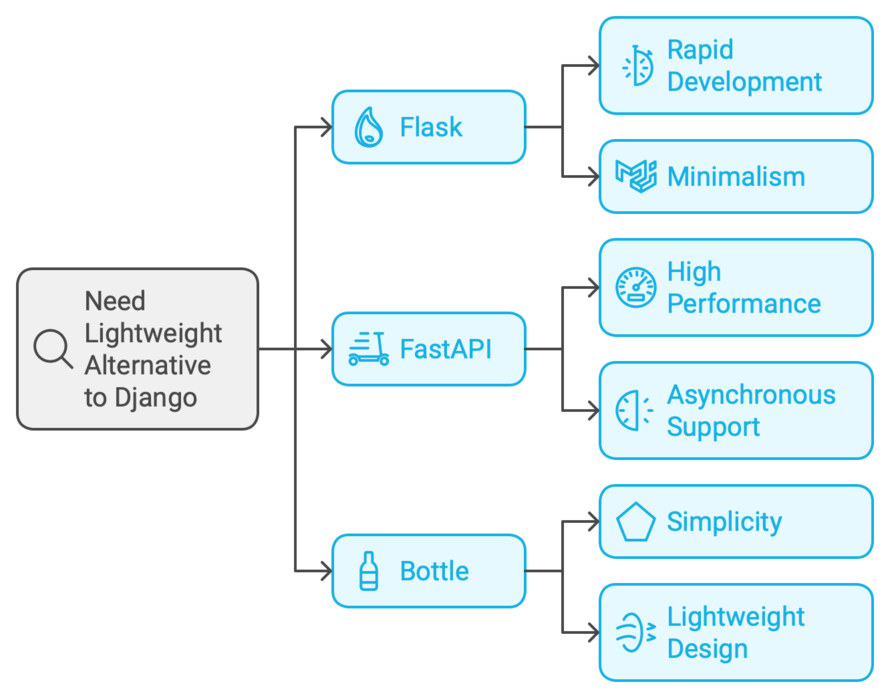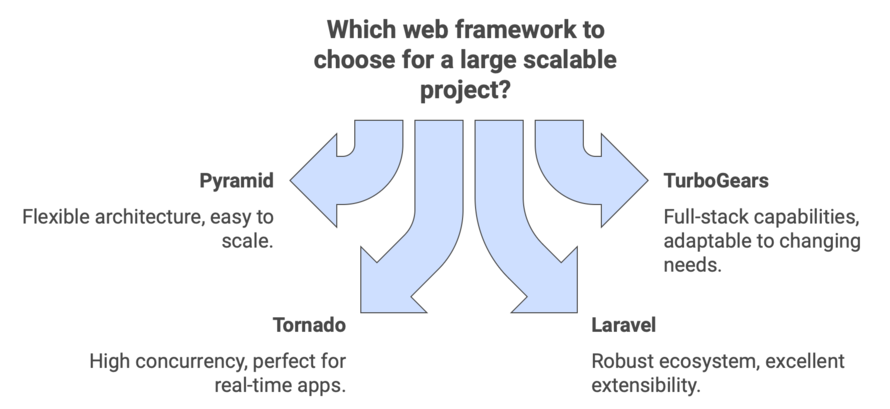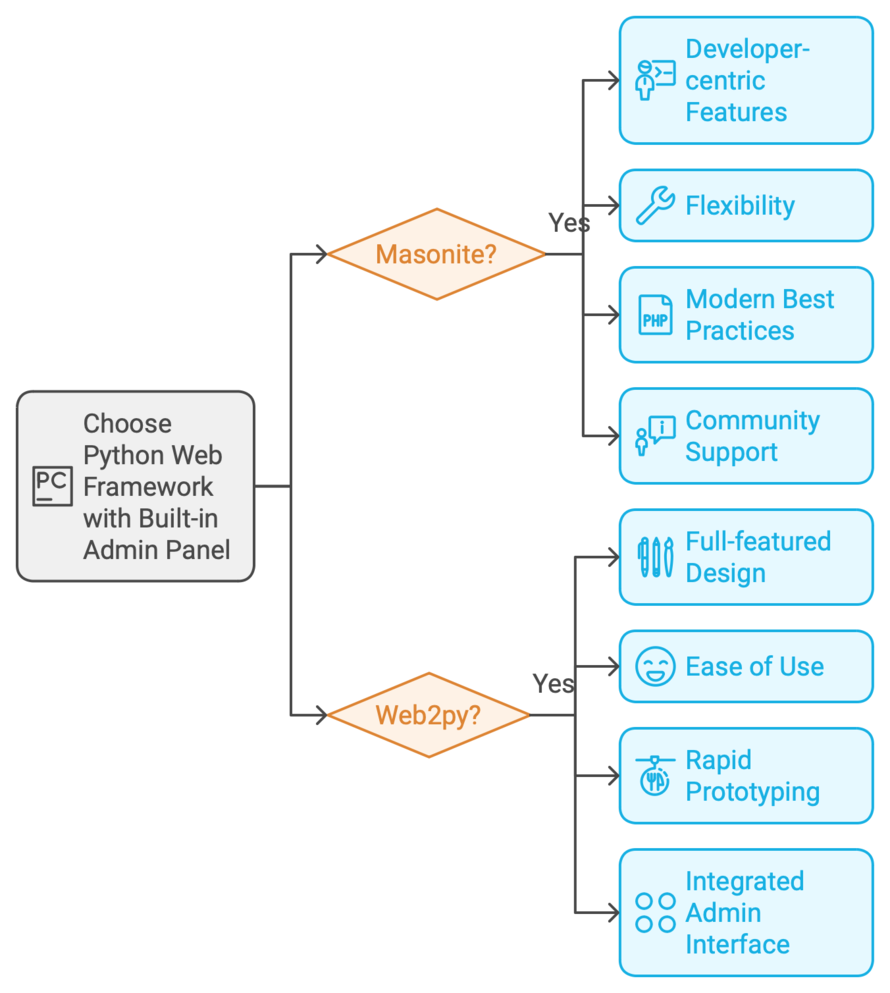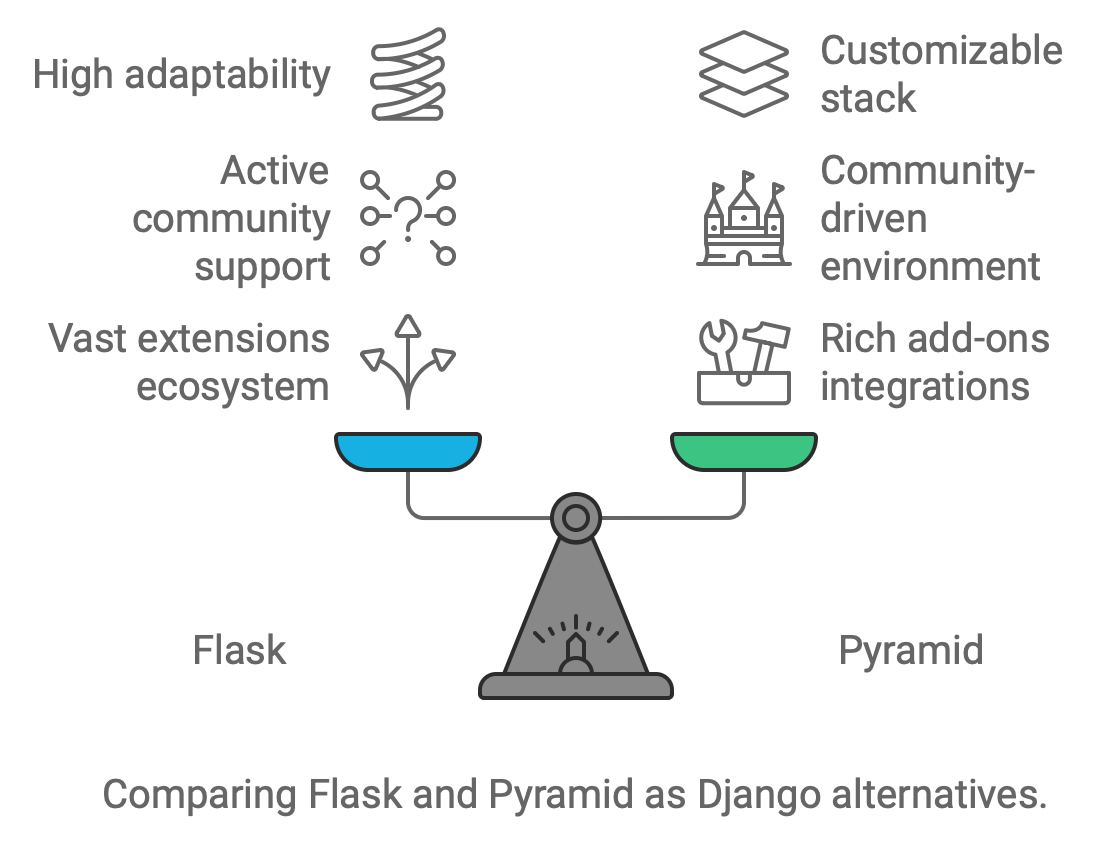What Are The Best Lightweight Alternatives to Django for Web Development?
For developers wanting lightweight alternatives to Django is a high-level framework known for its comprehensive features, there are good options. They rank simplicity and efficiency. Flask is a standout choice. This micro-framework allows for rapid development with minimal boilerplate code. Its flexibility makes it perfect for small projects and prototypes.Another contender is FastAPI. This framework is known for its high performance. It simplifies API creation and supports asynchronous programming. Its user-friendly and well-suited for modern web applications. Bottle stands out as well; its incredibly lightweight and requires just a single file to get started.
Bottle is ideal for small apps or quick tests. It is simple but functional. These frameworks offer the agility many developers crave. They prove that, in web development, less is sometimes more. Compared to popularDjango frameworks that are often used for large-scale applications, Bottle is a light weight alternative that focuses on efficiency and simplicity. However, it's important to understand that is django used for frontend or backend development. It's primarily a backend framework, handling the logic and data behind a website.
Flask: A micro-framework for rapid development
Flask is a light weight micro-framework designed for developers who crave simplicity and speed. Its minimalism lets you build web applications fast. It has no unnecessary features. With Flask, you can get started almost immediately.
The straightforward structure makes it easy to understand and install core functionalities. You wont find any steep learning curves here. This framework supports extensions that can add various capabilities when needed. For database integration or form validation, an extension likely exists.
The community around Flask is vibrant, offering ample resources and support. This means youre never alone in your development journey. Flask is perfect for small projects or prototypes as it's a light weight, open-source web framework. It excels where rapid app development is crucial. Its flexibility makes it suitable for complex applications as your needs evolve.FastAPI: High-performance, easy-to-use framework for APIs
FastAPI is popular. Developers want a high-performance framework to build APIs. Its design is all about speed and simplicity. It is perfect for projects needing rapid development.
Built on standard Python type hints, FastAPI automatically generates interactive API documentation. You can test your endpoints directly from the browser, with no setup. One of its standout features is asynchronous support, which allows for non-blocking requests. This makes FastAPI great for apps needing high concurrency or real-time communication.
Its performance benchmarks often exceed those of other frameworks, like Django and Flask. This is due to its efficient handling of requests and responses. The FastAPI community is vibrant. Many resources help both beginners and pros navigate their projects.
Bottle: Simple and lightweight web framework
Bottle is a minimalist web-framework. It is known for its simple, light weight design. It's perfect for small apps or prototyping. It lets programmers start quickly, without complexity. With just one file and no dependencies, Bottle makes deployment straightforward. Its core features include routing, templates, and access to various databases.
You can easily define routes using simple decorators. The micro-framework supports WSGI servers. You can run your app anywhere. Its templating engine lets you add dynamic content to your HTML pages. If you want flexibility without the overhead of larger frameworks, try Bottle. It could be an excellent choice.
Which Django Alternatives Offer Better Scalability for Large Projects?
When it comes to scalable, certain frameworks stand out for large projects. Pyramid is among the top choices. Its flexible architecture allows developers to build complex applications with ease. You can start small and scale up without major rewrites. TurboGears also deserves mention for its full-stack capabilities. It uses parts from various frameworks. So, you can build apps that grow as your needs change. Tornado shines in environments requiring high concurrency. Its async networking can handle thousands of connections at once. So, it's perfect for real-time apps. Laravel, with its robust ecosystem and focus on developer happiness, also provides excellent extensible for large projects. The right framework can greatly affect how well your app scales over time. Each option offers unique advantages tailored to different project requirements and team dynamics. For instance, express django is well-suited for rapid prototyping and building scalable applications, while Laravel excels in complex web applications with a focus on user experience.
Pyramid: Flexible and scalable framework for complex applications
Pyramid stands out as a robust choice for programmers seeking flexibility. It is built for complex applications. It has an adaptable architecture for various project needs. Its "start small, finish big" philosophy lets you begin with few features and expand as needed. This makes Pyramid perfect for both simple websites and extensive enterprise-level solutions.
The framework prioritizes configuration over convention. It lets programmers customize their projects extensively. It has a powerful routing system and supports many authentication methods. So, it's easy to build secure applications. It also includes a built-in web server for development and testing, making it convenient for rapid iteration.Pyramids community is active and vibrant. Rich documentation aids newcomers while seasoned programmers can leverage advanced capabilities seamlessly. It's easy to integrate third-party libraries, too. This makes the framework versatile in many contexts.
TurboGears: Full-stack solution for scalable web development
TurboGears stands out as a robust full-stack framework designed for extensible web development. It combines the best features of various technologies. So, it lets programmers build apps quickly. With TurboGears, you get an MVC architecture that simplifies code organization. This structure promotes maintainability and enhances collaboration among team members.
One of its key strengths lies in its flexibility. You can choose components like SQLAlchemy for ORM or Repoze for authentication. This adaptability makes it suitable for projects of all sizes. TurboGears also supports RESTful API seamlessly, making integration with front-end frameworks straightforward.
As your app grows, TurboGears will handle increased demands. The community around TurboGears is vibrant and offers extensive documentation. Programmers gain from shared resources and support. They improve their experience with this dynamic framework.
Tornado: Asynchronous networking library for high-concurrency
Tornado stands out as a powerful asynchronous networking library. It's specifically designed for high-concurrency applications. It is ideal for scenarios where thousands of clients need to be served at once.
1. Tornado's non-blocking network I/O sets it apart. It allows efficient handling of many connections. 2. Tornado excels in performance. 3. It is great for real-time web apps and long-lived network connections.The framework supports WebSockets seamlessly, enabling interactive features that enhance user experience. It's built for microservices needing fast responses under heavy load. With an easy-to-understand syntax, Tornado offers flexibility without compromising on speed. The community is growing. It ensures support for programmers using it.
What Are The Top Python Web Frameworks with Built-in Admin Panels?
When it comes to Python frameworks with built-in admin panels, Masonite stands out. This programmers-centric framework provides an intuitive administration interface that simplifies managing application data. It's sleek and easy to use. Ideal for programmers who want efficiency without losing functionality. These frameworks remove the need for external tools or plugins. They make development much easier. By using their built-in features, programmers can save time. They can boost productivity while controlling complex projects.

Masonite: Developer-centric framework with admin capabilities
Masonite stands out as a programmer-centric web-framework that seamlessly integrates administrative capabilities. Built on the principles of simplicity and elegance, it streamlines the development process.
- Flexibility is another hallmark of Masonite. Programmers can customize it to meet project needs.
- Masonite, focused on modern best practices, uses modern techniques.
These include dependency injection and task scheduling. It's designed for those who appreciate efficiency in both functionality and code readability. The vibrant community around Masonite offers resources and support. This helps newcomers and gives advanced users valuable insights.
Web2py: Full-featured framework with integrated admin interface
Web2py stands out as a full-featured web application framework designed for simplicity and efficiency.
Programmers can focus on building, not configuring. This framework is known for its ease of use. With minimal setup required, you can start developing your application almost immediately. The built-in web-based IDE enhances the experience by providing real-time feedback during development.
Web2pys design supports rapid prototyping while maintaining robustness for larger projects. It integrates with databases. It supports various deployment options, including cloud hosting.
Which Django Alternatives Provide Better Support for Modern JavaScript Integration?
When it comes to modern JavaScript integration, several Django alternative frameworks shine brightly. Dash stands out with its React-based architecture. This framework is best for web apps that need high interactivity and data visualization. Programmers can easily create stunning dashboards that respond dynamically to user input. Sanic offers an asynchronous framework that's purpose-built for high-speed performance. It works well with modern JavaScript-libraries. Programmers can quickly build responsive web apps with it. Its non-blocking design handles many requests at once. So, it's a favorite for those who value speed and efficiency. These frameworks are for programmers who want to connect Python backends to rich JavaScript frontends, especially those looking for alternatives to using Django, which comes with a more comprehensive feature set, or Ruby on Rails. Async programming models aim to create a smooth tech integration in projects.Dash: React-based framework for analytical web applications
Dash is an innovative framework designed for building analytical web applications development with ease. It combines Python programming language power with React's. So, it's a favorite of data scientists and analysts. With its component-based architecture, Dash allows programmers to create interactive user interfaces effortlessly.
Dash supports real-time updates without reloading the page. This feature enhances user experience significantly by allowing dynamic interactions within your app. Dash is a strong tool for modern analytics. It works for dashboards and detailed reports. As popular backend frameworks changed towards the need for more dynamic and responsive web applications, Dash emerged as a powerful solution for building interactive data visualization tools.You can visualize complex datasets using built-in components like graphs and tables. This makes presenting insights both visually appealing and intuitive. Dash is a perfect fit with popular data science libraries, like Pandas and NumPy. It stands out for this. With large data sets, users can quickly find insights.
Sanic: Async framework compatible with modern JavaScript libraries
Sanic stands out as an asynchronous framework that embraces modern web development trends. It's fast and efficient, so it's great at handling many requests at once.
- Enhanced Development Flexibility: Seamless integration allows programmers to leverage the power of established JavaScript-libraries, expanding their development capabilities and options.
- Streamlined Development Process: This compatibility eliminates the need to build from scratch, saving time and effort for programmers.
- Improved Performance: The integration allows programmers to create dynamic apps using async programming, resulting in a more responsive user experience without compromising server performance.
- Enhanced User Experience: Responsive user interfaces (UIs) provide a smoother and more engaging experience for users, enhancing their overall satisfaction.
- Access to a Rich Ecosystem: Programmers gain access to a vast ecosystem of JavaScript-libraries, offering a wealth of pre-built solutions for various functionalities.
What Are The Best Django Alternatives for Rapid Application Development?
When speed is key, CherryPy shines. It's a minimalist framework for quick prototyping, making it one of the best web frameworks for developing web applications quickly. Its simplicity allows programmers to set up web applications effortlessly without unnecessary complexity. With built-in tools and an intuitive design, getting started with CherryPy is straightforward. Falcon takes the spotlight when it comes to building speedy APIs. This bare-metal framework is optimized for performance, making it one of the best web-frameworks for developing high-throughput applications. It is perfect for high-throughput apps. If you need fast response times and efficiency, consider Falcon. Both frameworks rank ease of use while delivering effective solutions for application development. When we compare Django, a robust full-stack framework, with Flask's light weight approach, the choice often depends on specific project requirements and programmer preferences. Each offers unique features that cater to the fast-paced world of software development.CherryPy: Minimalist framework for quick prototyping
CherryPy stands out as a minimalist python web framework, designed specifically for quick prototyping. Its light weight structure lets programmers easily set up and run apps. There's no steep learning curve. This framework is simple but has key features. It has built-in tools for unit testing and supports sessions.
The simple API lets you focus on building, not on complex configs. CherryPy can serve both static and dynamic content, without a hitch. It's a strong feature. You can create web applications that are responsive yet efficient with minimal overhead.
Falcon: Bare-metal framework for building speedy APIs
Falcon is a lightweightPython web framework designed specifically for building fast API. Its bare-metal design has no unnecessary baggage. So, programmers can create quick, efficient apps that render web pages quickly and smoothly. One of Falcon's standout features is its performance. It can handle thousands of requests per second. So, it is ideal for high-load environments. This speed comes from its focus on raw performance rather than bells and whistles. The framework has a simple, intuitive design that allows programmers to quickly set up endpoints and write concise, readable source code without unnecessary complexity.With clear docs and an active community, adopting Falcon is easy for newcomers. Falcon uses asynchronous capabilities to integrate into modern apps. It keeps the code clear. Programmers love its flexibility for building custom Django Rest framework services and microservices.
Which Python Web Frameworks Offer Better Performance Compared to Django Framework?
When it comes to raw performance, FastAPI stands out. This framework is built on Starlette. It uses Python's async features to handle requests efficiently. Its particularly well-suited for building API that must speed without sacrificing functionality. Sanic also deserves attention in this category. Its asynchronous nature lets it handle many requests at once. So, it's perfect for performance-critical apps. Programmers often prefer Sanic when they need lightning-fast response times. Django may be a great choice for building complex web applications, but when you need speed and efficiency, FastAPI and Sanic are excellent alternatives. Both frameworks use modern Python features. They are much better than older setups like Django web framework. This makes them great for teams of python developers wanting to optimize their web apps. They need to handle complex tasks while being responsive and scalable. The rapid-development of the web framework written in python has resulted in a strong emphasis on performance and flexibility.FastAPI: High-speed framework leveraging asynchronous capabilities
FastAPI has emerged as a standout choice for programmers seeking speed and efficiency. Its asynchronous features allow it to handle many requests at once. This makes it ideal for high-performance apps.
Built on Python type hints, FastAPI offers automatic validation and serialization of data. This means fewer bugs and less time spent debugging code. The framework is user-friendly. Its intuitive design makes it easy to learn, even for beginners. Another impressive feature is the built-in support for OpenAPI documentation. As you build your API, FastAPI generates interactive docs. They boost collaboration with front-end programmers and other stakeholders.
FastAPI supports various asynchronous libraries like Starlette and Pydantic under the hood. This not only boosts performance but ensures scalability across different project sizes. It also embraces the principle of convention over configuration, simplifying development and reducing the need for boilerplate code.Sanic: Ultra-fast async framework for performance-critical applications
Sanic stands out in the Python web-framework landscape due to its focus on speed and efficiency. It uses asynchronous programming. This lets programmers write non-blocking code that can handle many requests at once. This makes it an excellent choice for performance-critical applications.
The framework is simple and scalable. It has a minimalistic design but supports complex operations. Programmers can create highly responsive API. So, Sanic is ideal for real-time data processing or high-traffic apps. Another compelling feature of Sanic is its compatibility with modern JavaScript-libraries. This integration allows for seamless development of full-stack apps.
They need a strong backend and a dynamic frontend. Sanic, a web-framework written in Python, stands out with its asynchronous architecture, designed for high-speed performance. With its vibrant community and comprehensive documentation, getting started with Sanic is straightforward. The rich ecosystem supports easy expansion via plugins for extra features.What Are The Top Django Alternatives with Extensive Third-party Package Support?
Flask stands out with its vast ecosystem of extensions and plugins. This micro-framework allows programmers to choose components. It is highly adaptable for various projects. Its community is active, constantly creating tools that streamline development processes. Pyramid also excels in third party package support. It has many add-ons and integrations. They suit both small apps and large systems. Its flexibility lets programmers customize their stack. They aren't tied to rigid structures, unlike django comes with a more comprehensive set of features and tools out of the box.Both frameworks shine in environments where custom solutions are necessary. Users can build custom apps with the help of vast-libraries. They can use existing resources efficiently.
Flask: Large ecosystem of extensions and plugins
Flask stands out as a powerful micro-framework known for its simplicity and flexibility. Its greatest strength is its vast ecosystem of extensions and plugins.
1. Enhanced Functionalities: Programmers can easily enhance their projects with more functionalities tailored to specific needs. 2. Time Savings: Instead of building features from scratch, programmers can leverage pre-built extensions, saving valuable time and effort. 3. Increased Efficiency: Extensions streamline development processes by providing ready-to-use solutions for common tasks, improving overall efficiency. 4. Wide Range of Options: For authentication, form validation, or database integration, an extension likely exists, providing a wide array of options to choose from. 5. Community Support: Many extensions come with active communities where programmers can find support, share knowledge, and contribute to improvements.It should meet your needs. This rich selection allows developers to pick and choose tools without overwhelming complexity.
The modular nature of Flask encourages experimentation. Start small with basic features. Then, add advanced capabilities as your app grows. This adaptability makes Flask popular with both beginners and pros. They appreciate its ease of customizing web apps to develop suitable web solutions for diverse needs. Plus, the lively community adds new packages, so there are always fresh options.Pyramid: Rich set of add-ons and integrations
Choosing a framework for your next web project can be overwhelming. Fortunately, Pyramid stands out. Its many add-ons and integrations meet diverse needs. This flexibility lets programmers customize their apps. They can also use a vast library of resources. Pyramids modular architecture means you can start small and scale up as needed.
This framework has the tools you need for every stage of development. Use it to build either simple apps or complex systems. Its community-driven environment offers support via plugins and extensions. They help programmers improve functionality without reinventing the wheel. Django web application has versatility and strong support. So, trying alternatives like Pyramid could open new doors in web app development. The right framework should fit your needs and goals. So, weigh each option before choosing a path!

